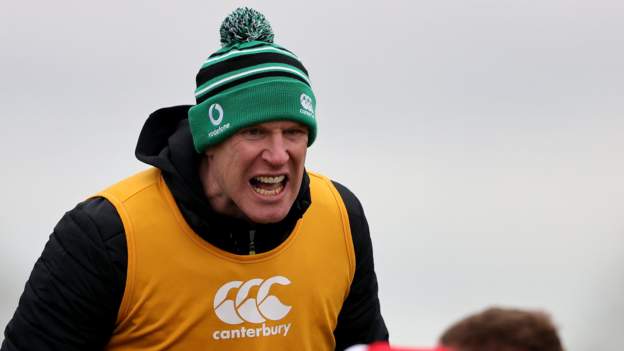
Without as much as a line-out thrown or a maul formed, Paul O'Connell's approval rating as Ireland forwards coach is through the roof.
O'Connell inhabits a rarefied air in Irish circles, one of very few players to have secured legendary status years before hanging up the boots.
The end still tastes bitter. A hamstring tear in the final group stage match of the 2015 World Cup was no way to close the curtain on an illustrious 108-Test career.
That unsatisfactory finale is among a myriad of reasons why, in normal circumstances, the first glimpse of O'Connell on the screens inside the Principality Stadium this Sunday would be greeted with an almighty roar from the travelling Irish support - rest assured though, the cheers will still come from living rooms across all four provinces.
The adoration 'Paulie' enjoys is, similar to the optimism surrounding his new coaching position, two-fold.
O'Connell's world-class leadership and technical ability have always gone hand-in-hand, one fuelling the other - the question is whether or not he can translate them into coaching.
Listening to those who played alongside him, you might conclude he has been doing exactly that for quite some time.
"He coached Ireland probably the whole time I was there anyway," says O'Connell's former international team-mate Stephen Ferris.
"He worked under a couple of different forwards coaches but he was the line-out master. He was the focal-point of Ireland's pack week in, week out."
"He was up there with the best team-mates you could ask for. Selfless. Everything he did was with the team in mind and he's no different now," says current captain Johnny Sexton.
"He worked under some of the best coaches over the years and he's strongly influenced by a couple of them.
"He's very strongly influenced by Joe Schmidt in and around his work at the ruck and how he thinks about the game."
Ireland's line-out will be watched closely during this tournament having been identified as a weak spot during Andy Farrell's first year in charge.
The introduction of O'Connell will only intensify the scrutiny on Ireland's set-piece in Cardiff, and throughout the championship.
The expectation emerges from the reputation.
"On the technical front he is a world class line-out operator, he always was," says Eddie O'Sullivan, the coach who gave O'Connell his international debut in 2002.
"He ran the line-outs for Ireland brilliantly, that's his forte and he's coming into an area that he has real expertise in."
'When he speaks, you listen'
This week Rory Best, the man who succeeded O'Connell as Ireland captain, explained how in international rugby, motivation is as important a coaching attribute as the technical side with windows relatively short and mountains of pressure on each game.
"Everybody says 'you don't need motivation to get up for playing for your country', well I'll tell you what, you do," agrees Ferris.
"When you're playing week in, week out getting absolutely battered, you have niggles, you're struggling to get yourself up.
"It can be very difficult to get yourself up for that both physically, emotionally and psychologically.
"Somebody like Paul who has been there and done it, has been a proven test player whether in an Irish jersey or Lions jersey.
"He's just the type of person that when he speaks, you listen, And a lot of the stuff that comes out of his mouth makes a lot of sense."
O'Connell's leadership saw him named captain of the 2009 Lions tour of South Africa, and his speeches that were caught on camera across his three Lions tours give an indication of his locker room presence.
There have been two words of caution amid the fanfare that greeted his latest appointment: he may need time to find his feet as an international coach, and he may need time to figure out how he approaches a coaching relationship with players who were, for years, team-mates.
Even in those doubts there remains a hope, verging on an expectation, that his approach to the game will allow for a seamless transition.
"The guys who have played with him, they know O'Connell, there will be no soft option with him," says O'Sullivan.
"He just says it how it is and if you don't like it, that's your problem, not his."















 Phone: (800) 737. 6040
Phone: (800) 737. 6040 Fax: (800) 825 5558
Fax: (800) 825 5558 Website:
Website:  Email:
Email: 






